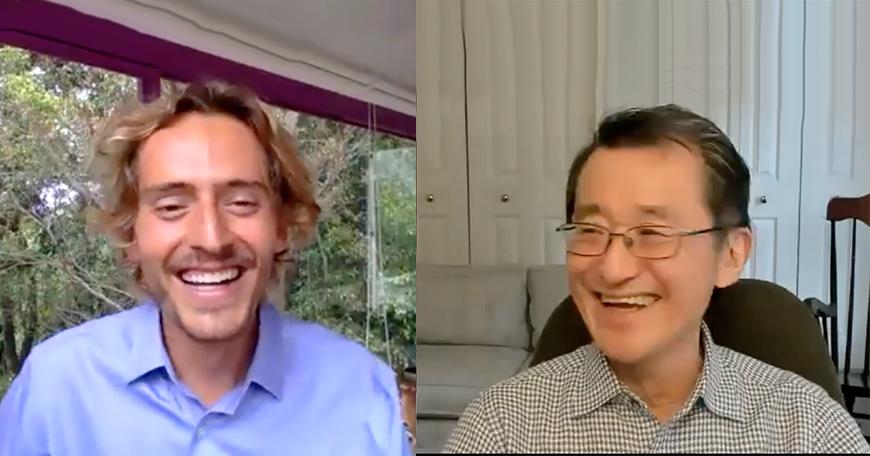
Bruno Verdini Breathes New Life into Leadership & Negotiation
In his May 12 xTalk “Reciprocity in Leadership and Learning: Negotiating Impactful Partnerships,” Bruno Verdini shared the philosophies that underlie his teaching in 11.011 and 11.111, two extremely popular courses in the Department of Urban Studies and Planning, both of which focus on Negotiation and Leadership.
Deeply respected and beloved by his students, some of whom attended this xTalk, Verdini began by sharing three foundational principles that inform his teaching and his work, one that focuses on drawing from within, honoring the meaning of the Latin word educo. Luminosity relates to reaching talented MIT students at a point in their young lives where they're eager to incorporate new perspectives and engage in deeper self-examination. Embodiment is the quality of complete commitment to forge a match between inner voice and material work, expressed not only by the students, but equally by instructors, TAs, and course staff. Thirdly, Reciprocity is rooted in fully understanding the agency, responsibility, and opportunities that arise when we own the consequences of our actions.
In conversation with Linguistics Professor and Senior Associate Dean of Digital Learning Shigeru Miyagawa, Verdini outlined ways to approach negotiation not as a win/lose equation but instead as a potentially symbiotic relationship where persuasion is evaluated not on how we secure power but instead on why, how, and for whom we wield power. Spiritual values from an array of traditions are integrated along with an awareness of multiple economic, social, and cultural perspectives. Students develop, refine, and carry the skills and insights they gain in Verdini’s course into their work, lives, and careers. Miyagawa quoted a former student who relayed how Verdini's course helped her develop strengths and intuitions that made it possible for her to confront gender inequities in her work situation.
Negotiation exercises in Verdini’s class are drawn from a variety of interdisciplinary sources developed across different generations by experts who have contributed their expertise to the inter-university Program on Negotiation founded by MIT, Tufts, and Harvard Law School. Historical and current, national and global conflicts, are explored in depth, while students are equally encouraged to draw on cultural, emotional, and spiritual experiences in their own personal and work lives. Students are trusted to constantly examine existing role-plays and case studies, and besides mastering the tenet skills and strategies therein, imagine and manifest new, creative insights and iterations for future generations.
Verdini shared how he encourages students to measure progress in his classes: he initially de-couples introspection from performance in negotiation exercises because the development of long-term life skills through self-reflection hinges on fostering curiosity, temperance, humor, and humility, virtues that are far more valuable than what short-term outcomes might first imply. He also empowers students to remain focused on what they control across time and well beyond the classroom: the intent, awareness, and impact of their level of effort on the larger communities they join.
Though there are several hundreds of pre-registered participants, Verdini limits the class size. For example, the 11.011 lottery shapes a classroom number between 36 to 42. The number simulates a work community that thrives on tailored, mutual coaching. This is a small enough group to allow students to increasingly get to know each other’s original tendencies and styles, yet big enough to support a variety of different formulations for breakout negotiation universes (easily divided in multiple pairs, trios, quartets or sextets), where learners can test new ideas, genuinely evolve, and accordingly be recognized by their peers.
When Verdini’s classes migrated to remote, Zoom facilitated the video-recording of role-play negotiation exercises and provided students with virtually instant and valuable feedback on how they appeared to others, with an accent on facial and torso expressions. Verdini will continue to use this innovation when the class returns to face-to-face, in tandem with the traditional in-person video recordings that capture other features of body language.
The xTalk ended with a plea from one of his former students on how Verdini’s courses could be scaled to benefit many students beyond the lucky 36 or 42 in each class. Verdini’s answer reflected his connection to the MIT community as well as the world beyond: graduates of the course become advocates for negotiation modules in other courses at MIT and leading universities, they become negotiation coaches in their workplaces from NASA to the nation’s top hospitals, and they take “ownership of their journey,” modeling for others through their lives and work, what they learned with Verdini, about themselves.
In his concluding words, Miyagawa observed how MIT’s future goals on educating the “whole student” are beautifully exemplified in Verdini’s teaching.

